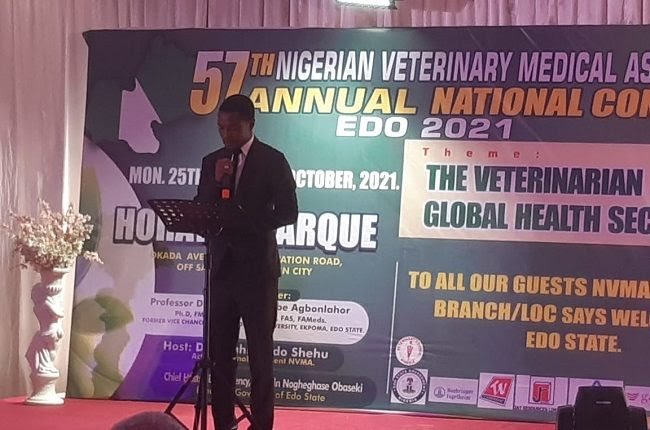ECONOMY
FG set to scale up contribution of livestock to GDP – Minister

The Federal Government says it will soon scale up the contributions of the livestock sub-sector to the country’s Gross Domestic Product (GDP).
The Minister of Agriculture and Rural Development, Dr. Mohammad Abubakar, made the disclosure in Benin on Tuesday, at the 57th Annual Congress of the Nigeria Veterinary Medical Association (NVMA).
Abubakar, represented by Dr Maimuna Habib, said veterinarians had a role to play in this regard, noting that the present five per cent contribution of livestock sub-sector to the GDP was inadequate.
According to him, the sector is confronted with limiting factors among which is the burden of diseases such as Contagious Bovine Pleuropneumonia (CBPP).
“Peste Des Petits Ruminant (PPR), Foot and Mouth Disease (FMD), Avian Influenza and African Swine Fever, among others, are mitigating against livestock production and productivity.”
“I am aware that veterinarians both in public and private sectors are contributing their quota to guarantee optimal health of animals for improved production and productivity.”
“To realise sufficiency in the contribution of livestock sub-sector to the Nigerian economy, we need to institutionalise effectively the control of major animal diseases in the country.”
“The Federal Executive Council has graciously approved an intervention fund to address the existing gaps in the animal health care service delivery in the country.”
“Very soon, the ministry is going to roll out activities in the control of transboundary diseases in the country,” he said.
In his address of welcome, the NVMA President, Dr Ibrahim Shehu, challenged veterinarians to deploy their professional skills to put an end to the importation of livestock and milk into the country.
Shehu, who bemoaned the huge amount the nation spent in the importation of the produce, noted that thousands of Nigerians had been denied job opportunities as a result.
He said it was paradoxical that despite the country’s tremendous potentials in livestock, especially cattle, Nigeria still imported over two metric tonnes of milk worth billions of dollars annually.
He further said that of the two metric tonnes of fish required in Nigeria annually, over one metric tonnes was imported, despite Nigeria’s large rivers, vast territorial ocean waters and diverse aquacultural practices.
“These are challenges, but they also provide opportunities for veterinarians to deploy their professional skills to ameliorate them for the socio-economic development of the country.”
“Nigeria and Nigerians beckon on us to ensure, among others, that there is sufficient meat, milk, eggs, and sea foods that are free of pathogens or antibiotics residues.”
“There are job opportunities in producing livestock, livestock-based products, poultry and fish, both for domestic consumption and export.”
“We have the capacity and sense of duty to face these challenges effectively,”he stated.”
Meanwhile, Gov. Godwin Obaseki has promised to implement the resolutions that would be reached at the 57th annual congress of the NVMA.
Represented by his deputy, Philip Shaibu, the governor said implementing the resolutions entailed strengthening the veterinary department of the state’s health sector.
He also said that the state was making efforts to provide more jobs opportunities for the people, especially the youths, by proffering solution to the challenges of electricity.
“With the issue of power solved, the youths, with the ideas they have, will grow themselves,” he said.
Speaking on the theme, “The Veterinarian and Global Health Security” Prof. Dennis Agbonlahor, the Guest Speaker, said research had shown that 75 per cent of zoonotic diseases were from animals.
He further said that 65 per cent of diseases in humans were from animals.
“This is a pointer to the fact that the veterinarians are expected to participate in global health initiative to advance global health security,” he said.
The Chairman of the occasion, Chief David Eqdebiri, called on the Federal and State Governments to pay special attention to the veterinary doctors.
He also called on the professionals to make their presence felt in society, adding that their job was too important to be suppressed or relegated to the background.
“Their job to the society is not less important to that of the other medical professions.”




 Davido's Net Worth & Lifestyle
Davido's Net Worth & Lifestyle 
